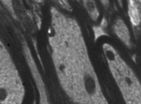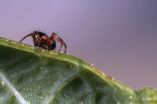(Press-News.org) Support for natural history – the study of organisms, how and where they live and how they interact with their environment – appears to be in steep decline in developed countries, according to Joshua Tewksbury, a University of Washington professor and WWF International scientist.
"Yet natural history provides essential knowledge for fields as varied as human health, food security, conservation, land management and recreation," he said.
Tewksbury and 16 other scientists from across North America outline the importance to society and call for a revitalization of the practice of natural history in an article in the April issue of BioScience.
Natural history is generally more concerned with observations and collections than with experimentation. It's thought narrowly as the purview of scientists bottling up specimens or pressing plants meant for museums. But natural history is really about looking at organisms so closely that one learns their habits and how they fit with what's around them. The approach works for understanding animals, plants and other organisms outdoors as well as at the microbial level in, for example, our bodies.
Among examples in the paper, the co-authors point out that effective fisheries management relies on natural history and that disasters such as the collapse of the Bering Sea walleye pollock fishery might have been avoided had natural history been used sooner. Many infectious diseases of humans – including avian influenza, Lyme disease, cholera and rabies – are linked at some point in their life cycles to other animals. Indeed 75 percent of emerging infectious diseases are associated with animals. Control strategies rely on knowing these hosts' natural history.
Increasingly sophisticated biological models still need observations from the real world, the authors point out.
"Despite the importance of detailed natural history information to many sectors of society, exposure and training in traditional forms of natural history have not kept pace with growth in the natural sciences over the past 50 years," they write.
Whereas universities in the 1950s, examined as part of the BioScience paper, required natural history courses for a biology degree, today the majority of U.S. schools have no such requirement, a trend that has coincided with the rise of molecular, experimental and other forms of biology. The rate of natural history publications in some disciplines has seen a parallel decline.
"You see collections being abandoned or consolidated," said Kirsten Rowell, a UW acting assistant professor, curator of malacology (shells) at the UW's Burke Museum of Natural History and Culture and a co-author on the paper. "People are being skirted around natural history. Graduate students were told natural history projects were not something valuable to science as a whole."
In the paper the co-authors offer recommendations for individuals and institutions interested in revitalizing natural history.
"There's hope, both within and outside of traditional natural history collections, in the rise of Internet- and smartphone-based technologies that allow the growth of broad partnerships, including citizen-science initiatives," Tewksbury said. An example is eBird, a web-based program developed by the Cornell Lab of Ornithology that has capitalized on the widespread interest in and appeal of birds. The program has witnessed a rapid, global increase in data contributors and users, which has enabled both researchers and the general public to benefit from technologies for the collection, organization and dissemination of vast numbers of bird observations.
Such programs are emerging but will need established professionals to self-identify as natural historians to provide the leadership for natural history to reclaim its necessary role, the authors assert.
INFORMATION:
The paper, a website and other materials emerged following a series of four workshops funded by the National Science Foundation and the UW College of the Environment.
Other co-authors from the UW are Jonathan Bakker, Timothy Billo, Peter Dunwiddie, Martha Groom, Noelle Machnicki and Liam Stacey; and from other institutions are John Anderson with the College of the Atlantic, Maine; Stephanie Hampton, University of California, Santa Barbara; Steven Herman with Evergreen State College; Douglas Levey with NSF; Carlos Martinez Del Rio with the University of Wyoming; Mary Power with University of California, Berkeley; Anne Salomon with Simon Fraser University; Stephen Trombulak with Middlebury College, Vermont; and Terry Wheeler with McGill University, Quebec.
For more information
Tewksbury, jtewksbury@wwfint.org
Rowell, rowellk@uw.edu
Suggested websites
BioScience article
Natural History Initiative
Natural History Project, with audio
Decline of natural history troubling for science, society
2014-03-27
ELSE PRESS RELEASES FROM THIS DATE:
Big data keeps complex production running smoothly
2014-03-27
Large amounts of data are produced when industrial companies monitor their facilities. Sensors check temperature, pressure, power, or energy use data. "If you're scanning to the nearest second, it's easy to rack up several terabytes of information in under a week," says Dr. Olaf Sauer from the automation business unit at the IOSB. But often there is a lack of suitable methods to evaluate the information. "Today's operators use only about seven percent of this data for maintenance or protection from breakdowns," adds Sauer. At the Hannover Messe Digital Factory, IOSB developers ...
One size does not fit all: Dietary guidelines for choline may be insufficient
2014-03-27
What is now considered to be the "right" amount of the essential nutrient, choline, might actually be "wrong," depending on who you are. That's because scientists have found that the "right" amount of choline needed by an individual is influenced by a wide range of factors, including gender, life stage, race and ethnicity of the individual. This means that using the current one-size-fits-all approach to determining a person's vitamin and mineral needs may leave them in less than optimal health. Choline is an essential nutrient used by the body to construct cell membranes ...
First sightings of solar flare phenomena confirm 3D models of space weather
2014-03-27
Scientists have for the first time witnessed the mechanism behind explosive energy releases in the Sun's atmosphere, confirming new theories about how solar flares are created.
New footage put together by an international team led by University of Cambridge researchers shows how entangled magnetic field lines looping from the Sun's surface slip around each other and lead to an eruption 35 times the size of the Earth and an explosive release of magnetic energy into space.
The discoveries of a gigantic energy build-up bring us a step closer to predicting when and where ...
Military men more distressed by sexual harassment than military women, research finds
2014-03-27
WASHINGTON – Military men who are targets of frightening and threatening sexual harassment may experience more distress and work performance problems than military women who face the same treatment, according to research published by the American Psychological Association.
A total of 52 percent of military women said they had been sexually harassed compared with 19 percent of military men, and women more frequently reported they were very frightened by the experience than their male colleagues, according to a study published online in APA's Journal of Occupational Health ...
Gen X obesity a major problem for healthcare, workforce
2014-03-27
Researchers at the University of Adelaide have confirmed that if current trends continue, Australia's Generation X will overtake Baby Boomers for poor health, including rates of obesity and diabetes, which could have huge implications for healthcare and the workforce.
In a paper published in the online journal PLOS ONE, University of Adelaide researchers compared the health status of Baby Boomers (born from 1946–1965) and Generation X (1966–1980) at the same age range of 25-44 years.
They found Generation X had significantly poorer levels of self-rated health, and higher ...
Kaixin Jieyu Fang for treatment of vascular depression
2014-03-27
The Chinese compound Kaixin Jieyu Fang can be used to treat vascular depression; however, the underlying mechanism remains unclear. Dr. Ying Zhang and co-workers from Guang'anmen Hospital, China Academy of Chinese Medical Sciences in China This study established a rat model of chronic cerebral ischemia-caused white matter damage by ligation of the bilateral common carotid arteries. Rats received daily intragastric administration of a suspension of Kaixin Jieyu Fang powder. Kaixin Jieyu Fang was made from two prescriptions of Kaixin San and Sini San supplemented with Radix ...
Despatch from the field
2014-03-27
Researchers and the public can now have immediate access to data underlying discovery of new species of life on Earth, under a new streamlined system linking taxonomic research with open data publication.
The partnership paves the way for unlocking and preserving a wealth of 'small data' backing up research conclusions, which often become lost within a few years of an article's publication in an academic journal.
In the first example of the new collaboration in action, the Biodiversity Data Journal carries a peer-reviewed description of a new species of spider discovered ...
Acupuncture enhances antidepressant effect of Seroxat
2014-03-27
Acupuncture is more effective than oral antidepressants in improving depressive symptoms, and produces fewer side effects than tricyclic antidepressants. Despite the continued development of antidepressants and alternative/synergistic therapies, major depressive disorder has not been comprehensively recognized and treatment outcome is often insufficient. An epidemiological study addressing depression showed that poor recognition and treatment are largely linked to the lack of an accurate assessment tool and to patients' economic situation. Prof. Yong Huang and team from ...
Hormone levels linked to survival of deer calves, study suggests
2014-03-27
Levels of a key hormone in the blood may be important for the survival prospects of newborn animals, a study of wild deer suggests.
First-born male deer that have relatively high levels of the male hormone testosterone are less likely to survive their first year compared with their peers, the research shows.
Scientists say their findings suggest that high testosterone levels represent a risk to newborns which, when coupled with a new mother's inexperience, lowers their chances of survival.
High levels of testosterone in adult male animals, including deer, are known ...
Ultra-thin light detectors
2014-03-27
This news release is available in German. Subtle interactions of electrons and light make them so valuable for technology: ultra-thin systems of semiconductor layers can turn electrical voltage into light. But they can also be used the other way around and serve as light detectors. Until now, it has been hard to couple light into these layered semiconductor systems. Scientists at Vienna University of Technology solved this problem. They used metamaterials, which are able to manipulate light in the terahertz range due to their special microscopic structure.
Customized ...






